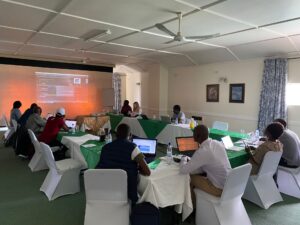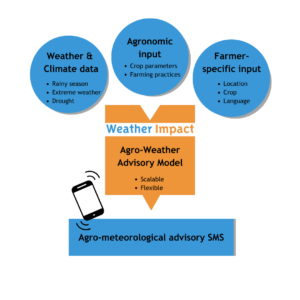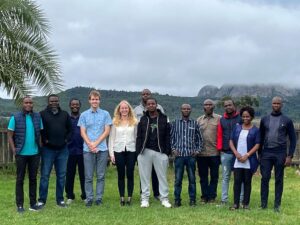Zimbabwe
Digital Climate Advisory Services
The multi-year partnership between the World Bank, Weather Impact, and high-level stakeholders in Zimbabwe’s agriculture sector continues: For the 2023-2024 growing season, Weather Impact is again providing agro-weather farming advisories to the smallholder agriculture sector of Zimbabwe to build climate resilience and support climate adaptation. This happens in close collaboration between Weather Impact and the Agricultural Technical Extension and Advisory Services (AGRITEX) Department from the Ministry of Lands, Agriculture, Water, Fisheries and Rural Development.
The aim is to deliver real-time agro-weather information to all stakeholders in the agricultural expert and extension chain. After providing almost 80.000 farmers with digital climate advisories in the first project, now about 6000 Agricultural Extension Officers (AEOs), supervisors of AEOs, district officers, and few agricultural experts from the ministry are receiving these advisories. The information will reach the farmers through a cascading effect whereby the AEOs are the ones that interpret and translate information for the farmers.
The agro-weather advisories and additional extreme weather alerts, are disseminated two times a week via SMS and evaluated with local partners for continuous improvement of the service.
Additionally to the mentioned 6000 recipients, a pilot group of 400 farmers is also receiving the SMSs. A local partner will execute an impact evaluation study on the service for both target groups.
Agro-Weather Advisory Model (AWAM)
The advisories are created based on Weather Impact’s AWAM that combines crop parameters and historical and future weather to create actionable farming advice. This advice is tailored to the recipient’s location, crop (e.g., maize, sorghum, ground nut), preferred language, and local farming practices.
Fig.1 Conceptual overview of Weather Impact’s Agro-Weather Advisory Model (AWAM); the input consists of weather and climate data, agronomic input and input from farmers. The data will be processed in AWAM, which results in SMS’s for farmers with farming advice.
Capacity building
Finally, to further support sustainable improvement of national hydro-met services, Weather Impact also delivers trainings on Python programming and QGIS. One of our core beliefs is that capacity building can create a lasting impact in the local hydro-meteorological sector, the agricultural sector, and for smallholder farmers.
Training on Python
In 2022 Weather Impact provided several digital and on-site trainings on Python. By offering these technical seminars, available weather and climate information can be put to use in different contexts in the agricultural sector.
Weather Impact has also provided a one week Python training in Zimbabwe to a selection of experts from the Meteorology Service Department (MSD), the Ministry of Agriculture (AGRITEX) and the Zimbabwe Farmers Union (ZFU). The goal of this training was to advance their knowledge about utilizing Python for agro-meteorological applications and dissemination of services amongst farmers. In specific, the following topics were covered:
- Python basics
- Data formats like netCDF and csv
- Dealing with climate and forecast data
- Developing your own crop model
- Operationalizing services using a scheduler and utilizing Telegram
The training was perceived very positively and participants said to be using Python on their daily work from now on.
“Great facilitation skills, content well prepared and the concepts covered are important in solving DCAS challenges in Zimbabwe.”
Shylock Muyengwa – Zimbabwe Evaluation Association
Read more
- about the first digital training we provided online to the Meteorological and Agricultural departments of Zimbabwe on Python and QGIS basics.
- about the physical Python training by Janina and Bob in Zimbabwe

Fig. 2 and 3; Training session during the one week training about Python in Nyanga National Park in the Eastern highlands of Zimbabwe.
Group photo of all training participants and the trainers Bob Ammerlaan and Janina Fraas.



